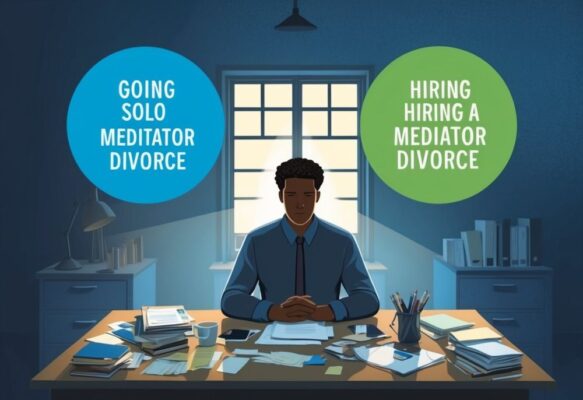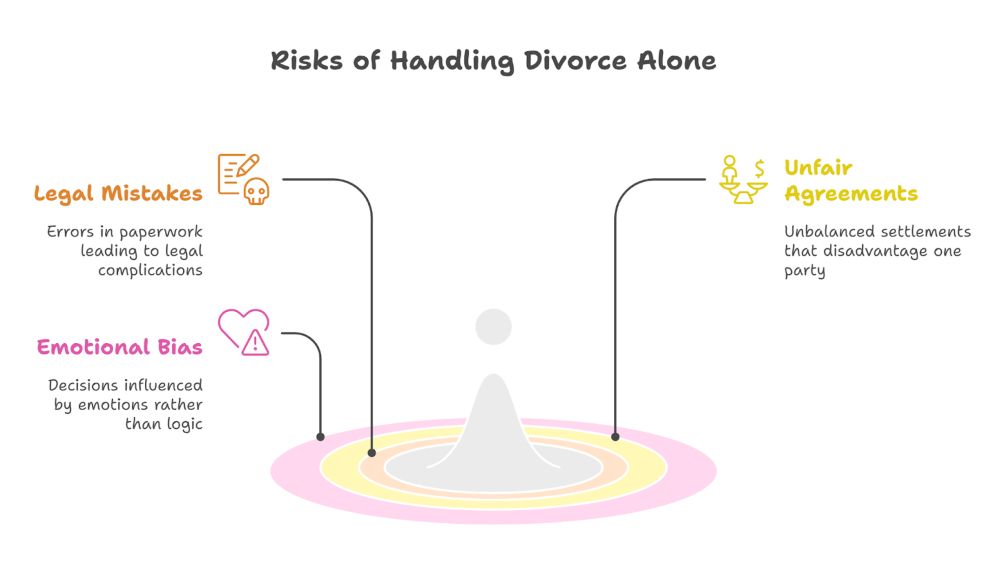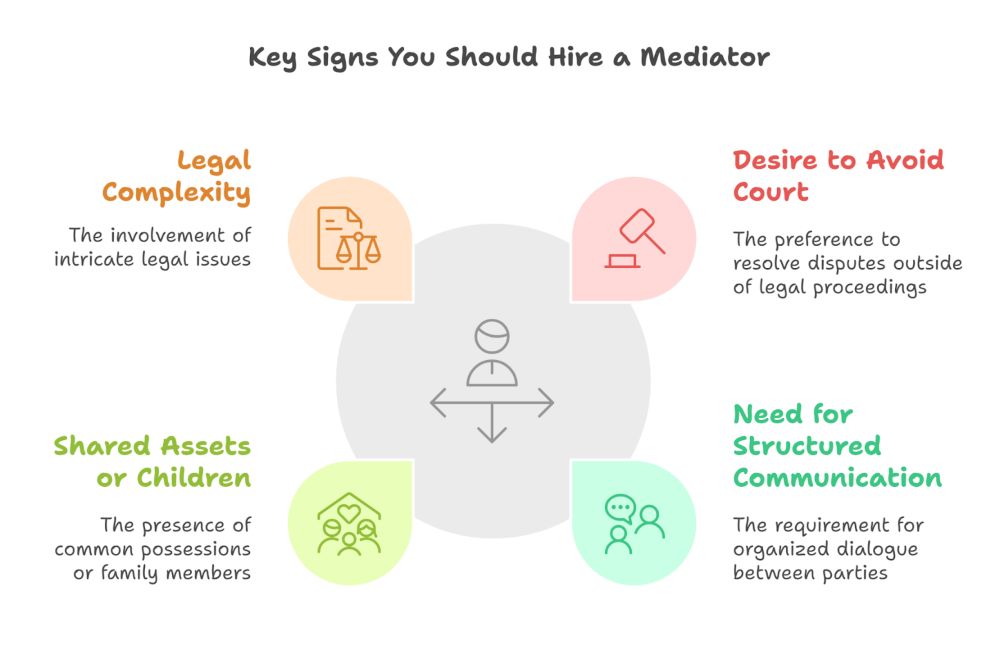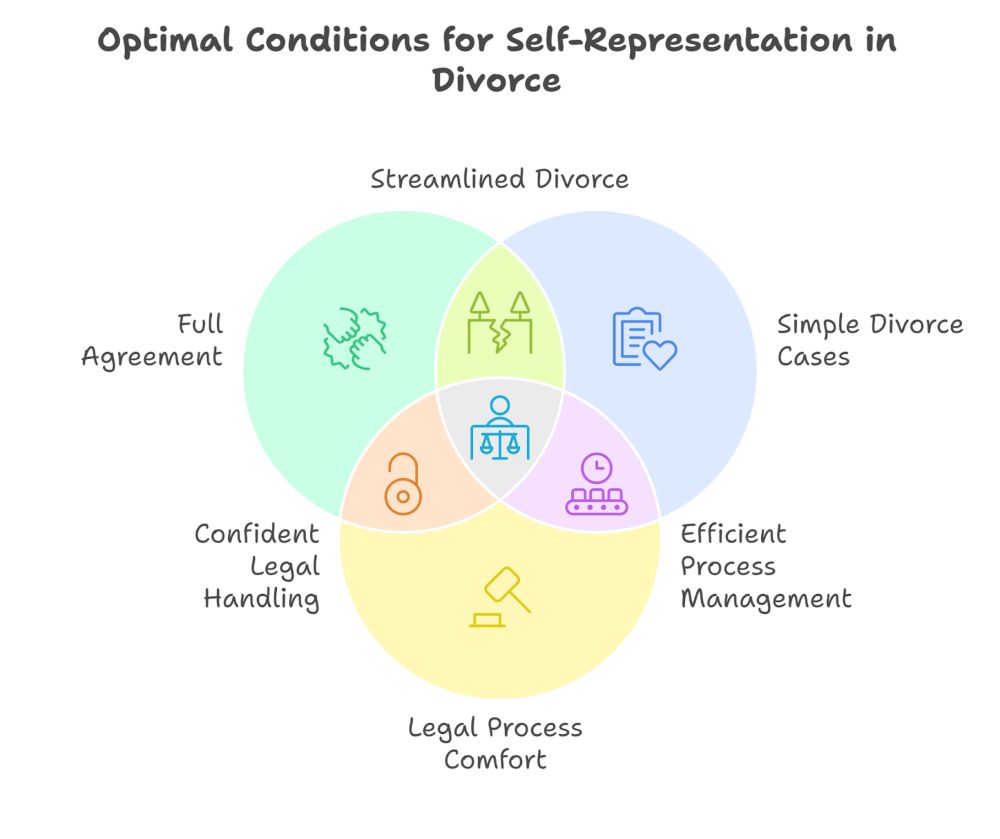
The Pros and Cons of Going Solo: When You Should Hire a Mediator Instead of Handling Divorce Alone

Divorce can feel overwhelming. Deciding whether to go it alone or bring in a mediator adds another layer of stress.
You might wonder if saving money by handling everything yourself is worth the emotional and legal challenges.
Choosing a mediator can make the process smoother, less combative, and often less expensive than proceeding without one, especially if you and your spouse are willing to work together.
Let’s dig into what going solo in divorce looks like, when it might be a good idea, and when having a neutral mediator can truly help.
The right choice depends on your specific situation, your relationship with your spouse, and your comfort level in handling complex issues independently.
Key Takeaways
- Mediators help make divorce less stressful and more affordable.
- DIY divorce has pros, but also real risks and limits.
- Your choice depends on your comfort with the process and your unique needs.
Understanding DIY Divorce vs. Mediation

When you end a marriage, you can either try to handle the process yourself or ask a neutral third party to help both sides work together.
Each option has different steps, potential costs, and risks that you should consider before making a decision.
What Is a DIY Divorce?
A DIY (Do-It-Yourself) divorce means you and your spouse handle the whole process without professional help. You fill out legal forms, file them with the court, and make your own decisions about property, money, and parenting.
DIY divorce is typically best if you and your spouse agree on all aspects. This way is often cheaper and much faster.
You avoid lawyer fees and can control the timeline. Some states offer online tools or simple instructions to make the process easier.
But DIY divorce can be risky. The paperwork can feel confusing.
If you miss a step, omit a detail, or misunderstand something, your case may be delayed or even dismissed. Mistakes might also lead to unfair agreements or legal problems later.
DIY divorce isn’t a good fit if there’s anger, mistrust, or complex issues like child custody or large debts. In such cases, consulting a specialist or using an alternative method may be a safer option.
Learn more about the differences in divorce options at Nolo’s comparison of lawyer and mediator roles in divorce.
What Is Mediation?
Mediation is a process in which a trained mediator helps you and your spouse find mutually agreeable solutions. The mediator does not take sides or make decisions on your behalf.
They help both of you communicate, listen to each other, and resolve disagreements. In mediation, you still make the final choices, but you have a guide to keep things calm and focused.
Mediation can be much less stressful than fighting in court. It usually costs less than hiring two lawyers but more than a DIY divorce.
One primary advantage of mediation is that it is particularly effective when emotions are running high or when complex issues are involved. The mediator helps both people feel heard and can suggest creative compromises.
Mediation isn’t always the best option for every situation. If one person refuses to be honest or there is a significant power difference, it may not work.
The Pros of Going Solo in Divorce

When you manage a divorce alone, you might save money, stay in control of decisions, and avoid making a simple process more complicated. This approach can be effective if both parties can communicate openly and agree on key points.
Lower Upfront Cost
Handling a divorce by yourself can help you avoid large legal fees and mediation costs. Court filing fees are usually your only required expense.
You don’t have to pay for a lawyer’s time or ongoing consultation. Self-help forms are available in most places, and many family courts offer free resources or workshops.
For straightforward divorces, such as those without children or significant property concerns, the DIY path can be a budget-friendly option.
This method appeals to many who want to keep things affordable and avoid spending thousands over several months.
By reducing your costs, you can allocate your money to other needs, such as new housing or covering living expenses as you move forward.
Full Control of the Process
You make every decision when you go solo. Nobody else sets the pace or tells you what you should accept.
You lead all talks with your spouse and move at a pace that suits you both. This can help avoid delays often caused by back-and-forth between lawyers or waiting for mediators to be available.
You won’t feel pressured by outside opinions, and you don’t have to compromise unless you truly want to. Your divorce moves at your pace, not someone else’s.
If you’re able to communicate directly with your spouse, this provides an opportunity to reach mutually beneficial agreements that meet both your needs.
Privacy & Simplicity (in Uncomplicated Cases)
Going solo in divorce means fewer people are involved in your private matters. This can help you keep sensitive issues between you and your spouse.
No third parties or attorneys need to hear details about your finances, property, or family.
When the situation is simple, such as when there are no children or few shared assets, and you both agree on what to do, handling things yourself keeps the procedures straightforward.
You can avoid extra paperwork, formal meetings, and stressful negotiations. This process can reduce tension and make it easier for you and your spouse to part ways respectfully, especially if you value your privacy and want minimal disruption.
Before you dive into divorce alone, let Peacemaker Mediation Group show you a better path. Our flat-fee mediation services make the process faster, friendlier, and far less stressful—schedule your free consultation now.
If you’re ready to get started, call us now!
The Cons of Handling Divorce Alone

Trying to manage your own divorce can seem less costly and more private. However, it can also open the door to many problems, including missed legal details, increased stress, and unfair outcomes.
Mistakes in Legal Paperwork
Handling divorce paperwork can be confusing. Forms must be completed with the correct details; otherwise, your filing may be rejected.
Many people who process their divorce alone often make errors, such as missing signatures, omitting key financial information, or failing to fully understand local rules.
Mistakes in forms or supporting documents may cause delays, incur additional fees, or even necessitate a restart of the process.
Some errors can even result in long-term problems, like an unenforceable custody plan or child support order. Without an expert’s help, you may not realize what you’ve forgotten until it’s too late.
Even small paperwork issues can have large impacts on your financial security and parental rights. Legal professionals ensure that all necessary forms are accurate, complete, and up to date.
Lack of Emotional Neutrality
Divorce can be stressful and bring up strong emotions. Even if you want the process to go smoothly, emotions such as anger, sadness, or fear can interfere with making good decisions.
You may react emotionally to your spouse’s requests or push for things out of spite or hurt rather than fairness. When you handle divorce alone, there is no neutral third party to guide the conversation.
You have to manage arguments and big emotions on your own. This can make disagreements more difficult to resolve and prolong the process.
A mediator acts as a buffer, helping manage fights and keep everyone focused on solutions. Without that support, you may feel overwhelmed and struggle to stay calm and reasonable.
Risk of Unfair or Unsustainable Agreements
Divorce decisions can have a profound impact on your long-term finances, the location of your children, and your daily life. Without support, it’s easy to agree to something under pressure just to “get it over with.”
You might accept a property split or child custody arrangement that isn’t fair or won’t work for you later. If your spouse has more knowledge or power in these conversations, you may face an even greater risk of losing out or being misled.
There’s also a chance you’ll overlook important rules, like retirement account rules or tax impacts. Agreements made without expert input might not be legally sound or easy to enforce in the future.
Mediators can help ensure that agreements are realistic, balanced, and clear for both parties, thereby reducing the likelihood of future conflict.
What a Mediator Brings to the Table
Divorce can be confusing and stressful when you handle it by yourself. Choosing a skilled mediator helps you work through major issues in a clear, structured, and often less expensive manner than fighting them out in court.
Neutral Guidance and Emotional Clarity
A mediator doesn’t take sides. You get someone who listens carefully to you and your spouse, helping both of you understand what truly matters to each of you.
Mediators encourage respectful, honest conversations. This can make things less heated and help both parties discuss tough topics, such as money, parenting, or property, with less conflict.
When emotions run high, your mediator steps in with calm questions and suggestions that refocus the discussion on making informed decisions. If you’re worried about handling disagreements on your own, this neutral guidance can reduce stress and help you think clearly.
Family law mediation in Florida often relies on this skill to maintain productive communication and achieve fair solutions.
Legal Structure Without Court Battles
A mediator helps you organize your discussions so nothing important is forgotten. They know the legal steps that need to happen for your divorce to be official and fair.
You and your spouse remain in control, but you still receive assistance in understanding the legal requirements surrounding matters such as child custody, asset division, and support.
The mediator can explain options in plain language, which makes legal matters less overwhelming.
This means you sign agreements you understand, not just what a judge orders you to do. It’s one of the primary benefits of hiring a mediator instead of representing yourself or proceeding directly to court.
Cost-Effective Compared to Litigation
Litigation is usually much more expensive than mediation. When you fight in court, you pay for lawyers, court filings, and sometimes expert witnesses.
These costs can add up fast. Divorce mediation typically uses fewer hours, and you split the cost with your spouse.
There are fewer meetings and less paperwork, which means you save both money and time. Most people find that mediation is worth it because it helps you avoid unexpected fees and lengthy delays.
By working with a mediator, you get solutions faster and have more money left for your next steps after your divorce.
Even amicable divorces can get complicated fast. If you and your spouse encounter a challenge, Peacemaker Mediation Group offers calm, structured mediation—virtual or in-person—to help you reach clear, lasting agreements without the drama of court proceedings.
If you’re ready to get started, call us now!
Key Signs You Should Hire a Mediator

Divorce can feel overwhelming and isolating, especially when thinking about handling everything alone.
Mediation provides a practical path that can help you achieve a more peaceful solution, enabling you to focus on what matters most to you and your family.
You Want to Stay Out of Court
If you’re looking to avoid the pressure and stress of courtrooms, hiring a mediator is often the better option.
Mediation provides you with more privacy and control over the outcome, allowing you and your spouse to work together without a judge making the decisions.
Benefits of mediation over the court:
- Flexibility in scheduling sessions
- Lower costs compared to long court battles
- Less public exposure of personal matters
People often choose mediation when they need a less hostile environment. In most cases, avoiding court allows for healthier communication and reduces conflict.
Mediation works well when you both want a fair agreement but do not want to go through the adversarial process of the court.
You and Your Spouse Can Communicate—But Need Structure
If you and your spouse are still able to talk calmly but get stuck or go in circles, this is a sign that mediation could be helpful.
You may agree on some issues but encounter difficulties on others, so having a professional mediator guide the process can help keep things on track.
A mediator helps structure your conversations, making sure each person is heard. This also helps prevent arguments from getting out of control.
Mediation isn’t just for people who always get along, but also for couples who need a neutral third party to manage tension and organize the process.
Common reasons to hire a divorce mediator:
- Talks always stall over parenting or money
- One person dominates discussions
- You want help sticking to the topics that matter
If you’re wondering, “Should I hire a divorce mediator?”—the answer is yes if open but unfocused communication is a roadblock.
You Have Shared Assets, Children, or Legal Complexity
When your marriage includes children, property, retirement accounts, or significant debt, self-managed divorce usually becomes risky.
Even if both parties are reasonable, the details can be complex, and legal paperwork must be completed accurately.
A mediator ensures that all assets and responsibilities are handled in a legally and clearly defined manner.
They can also guide you through creating a parenting plan, dividing property, and determining child support.
This structured help is especially valuable when legal rules are in effect or emotions are running high.
Examples of complexity that call for mediation:
- Child custody or visitation needs
- Splitting investments, a house, or a family business
- Questions about spousal support or medical coverage
If you’re asking, “When is mediation better than going to court?” In such cases, the answer is often when your situation involves children or complicated finances, as mistakes can be costly and difficult to rectify later.
When Going Solo Might Work

Sometimes, filing for divorce without an attorney is possible, especially if your situation is simple and you both want to keep things peaceful.
You may save money and stress if you meet certain conditions, and it’s important to know when doing it yourself is a good fit.
Extremely Simple Divorce Cases
Handling your divorce alone can work well when the process is straightforward. For example, if there are no children, no shared real estate, and few or no debts, filing for divorce without a lawyer can be a simpler process.
Simple divorce cases often involve short marriages or couples who do not have joint financial accounts. Many courts offer easy-to-follow packets that include all the forms.
Some states even have online services for uncontested divorces, which can make it less confusing to file on your own.
In such cases, you can find clear instructions on your local courthouse’s website or at the courthouse itself. You can move forward at your own pace, and filing fees are usually your only major cost.
If your divorce isn’t complex, a do-it-yourself approach can be practical and cost-effective.
Both Parties Fully Agree on Everything
If you and your spouse agree on every issue—like how property should be split or whether spousal support is needed—you can often file for divorce without help from an attorney or mediator.
This is called an uncontested divorce.
Checklist for an uncontested divorce:
- Both of you agree on how to divide the property and debt.
- You’re in total agreement about custody and parenting time if you have children.
- Neither spouse is hiding assets or income.
- No one is seeking revenge or using the divorce as a means to punish the other.
When you both agree, the paperwork and process become much easier. Courts usually process uncontested divorces faster, and forms can be submitted directly, either in person or online.
You may want to review if mediation is the right course for your situation, which you can read more about on MediateLawsuit.
You’re Comfortable Researching and Handling Legal Processes
Going solo works best if you’re willing to invest time in learning about your state’s divorce process and legal requirements.
This involves reading court rules, completing legal forms, and meeting deadlines for filing and serving papers.
You should feel okay asking questions at your local courthouse and checking that you’ve followed all steps before submitting documents.
Many people find tips, checklists, and help on court websites. Some counties even offer free self-help clinics where you can get basic guidance.
Before you start, make a list of every step in the process. Research common mistakes, such as not serving papers correctly, so you don’t delay your divorce.
If you prefer detailed instructions and working with forms, a solo approach may be suitable for you, especially if your divorce case is straightforward.
Final Thoughts: Choosing What’s Right for You
Choosing how to handle your divorce can impact your finances, stress level, and even your relationship with your ex-spouse.
Weighing your options helps you make a decision that meets your needs, values, and situation.
It’s Not About Right or Wrong—It’s About What Works
There’s no single perfect way to go through a divorce. What matters most is finding a process you feel comfortable with and that protects your interests.
If you and your spouse can discuss things openly and stay mostly calm, you might save money and time by handling things yourselves.
However, if trust has broken down or you feel uncertain about your legal rights, hiring a mediator can help maintain fair and balanced negotiations.
- Self-representation is best suited for simple splits without children or numerous assets.
- Mediation often suits when you need a neutral guide, especially for complex or emotionally charged conversations.
Putting your needs first, while respecting your unique situation, leads to better, less stressful results.
You deserve support, not overwhelm. At Peacemaker Mediation Group, we guide Florida couples through divorce with compassion, clarity, and full legal document prep—flat fees, no retainers, and no courtroom stress. Let’s talk today.
Contact Us Today For An Appointment
Frequently Asked Questions
Can I file for divorce in Florida without hiring a lawyer?
Yes, you can file for divorce in Florida without a lawyer, especially if both parties agree on all terms. This is referred to as an uncontested or pro se divorce, but it requires accurate paperwork and proper court filing.
What are the benefits of hiring a divorce mediator?
Hiring a divorce mediator can reduce conflict, lower costs, and shorten the divorce process. Mediators provide neutral guidance and help couples create fair, legally binding agreements outside of court.
When is it okay to handle a divorce without a mediator?
Handling divorce without a mediator may work if you have no children, no shared assets, and complete agreement on all terms. However, even simple cases can benefit from professional support and legal clarity.
How much does divorce mediation cost in Florida?
Divorce mediation in Florida typically costs between $2,000 and $5,000, depending on the complexity of the case. Peacemaker Mediation Group offers flat-fee pricing to make the process affordable and predictable for couples.
What are the risks of going solo in a divorce?
Going solo can lead to filing mistakes, unfair settlements, and emotional stress. Many self-filed divorces are rejected due to paperwork errors, and unresolved issues can lead to future legal disputes.
What’s the difference between a lawyer and a mediator in divorce?
A lawyer represents one party’s interests, while a mediator remains neutral and works with both parties. Mediators help couples reach mutually agreed-upon agreements without resorting to court or escalating conflict.
How do I know if mediation is right for my divorce?
Mediation is ideal if you and your spouse are open to communication and want a private, cost-effective resolution. If children, property, or future co-parenting are involved, mediation can simplify the process and reduce tension.




